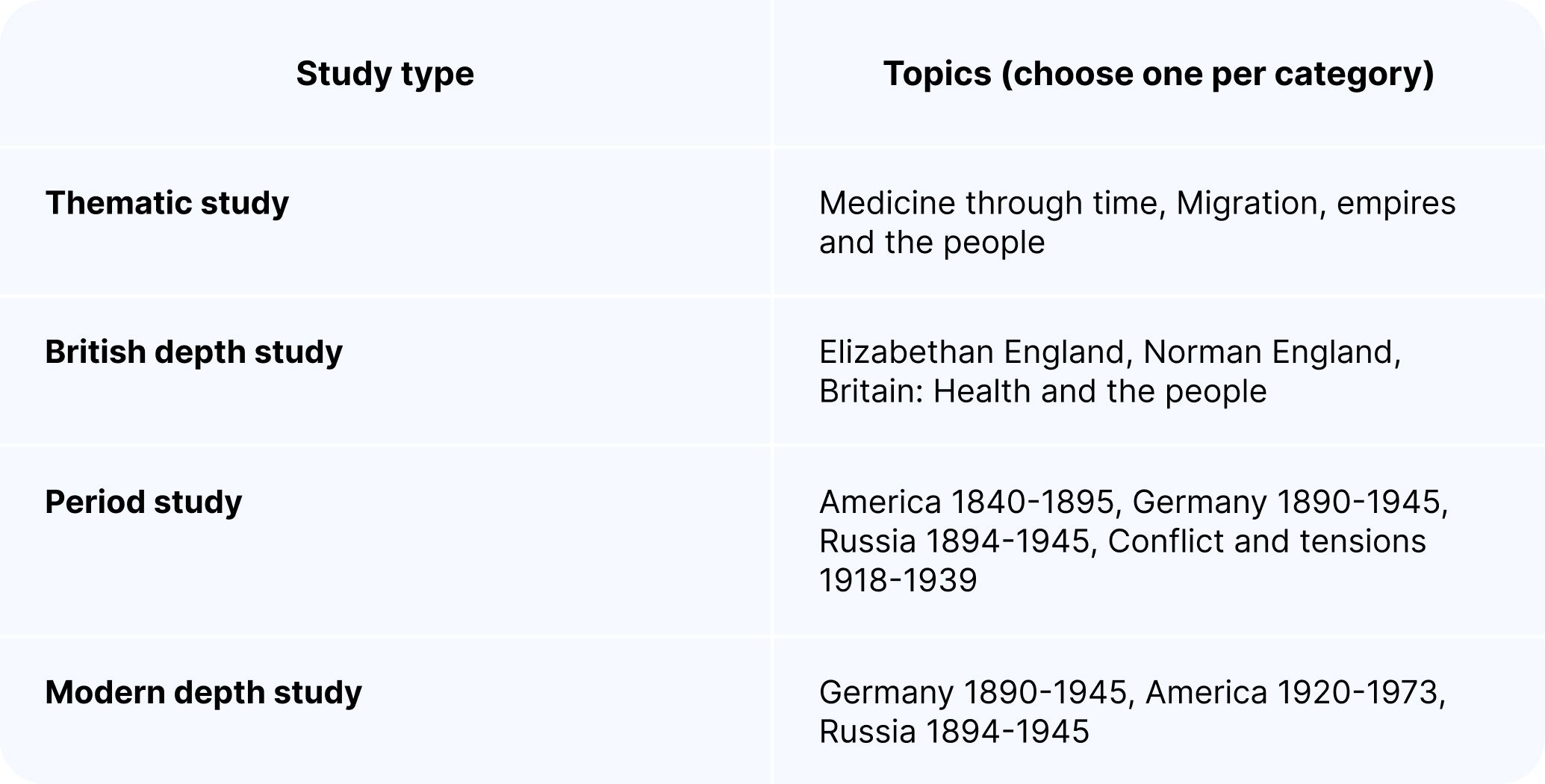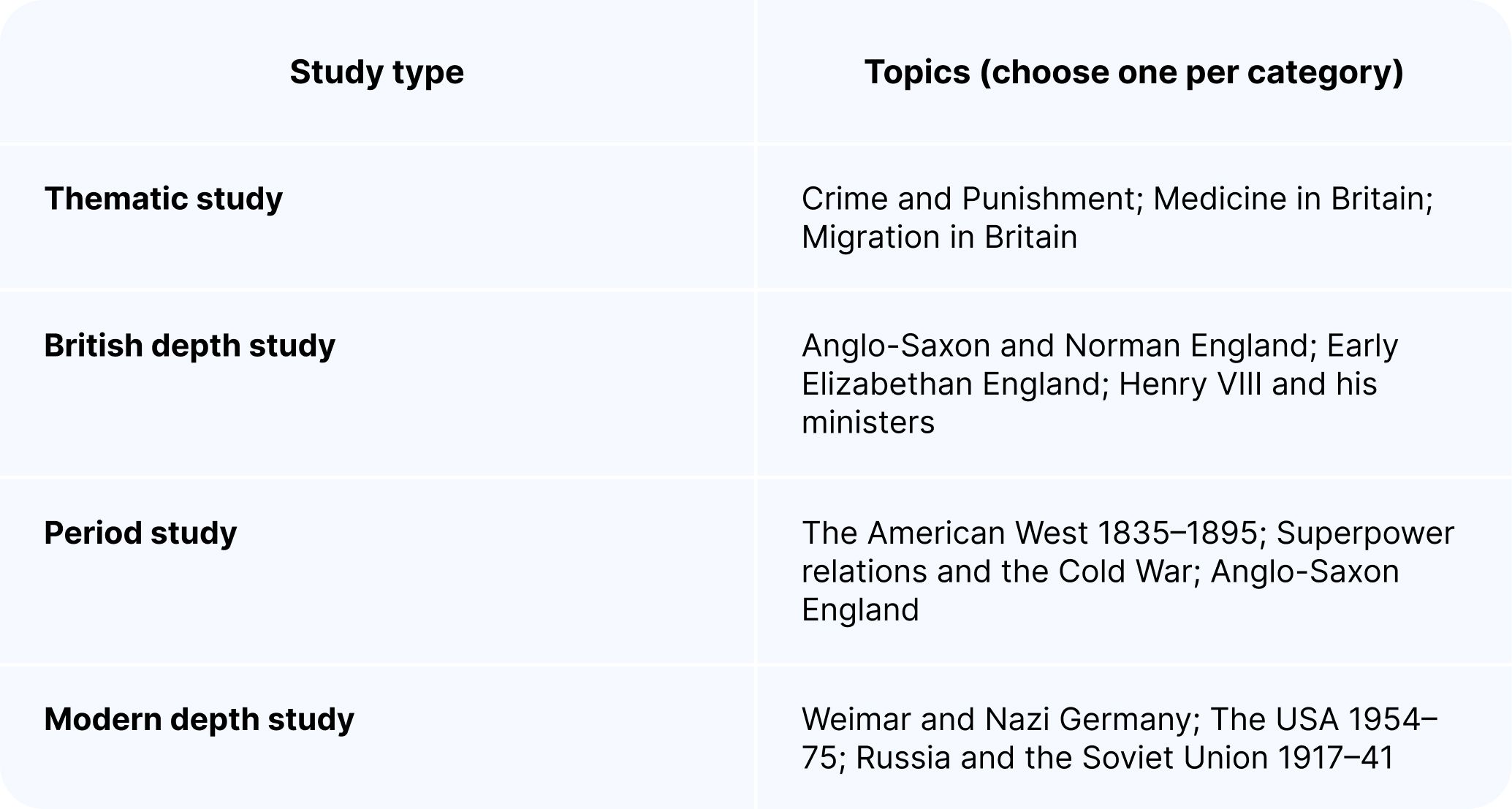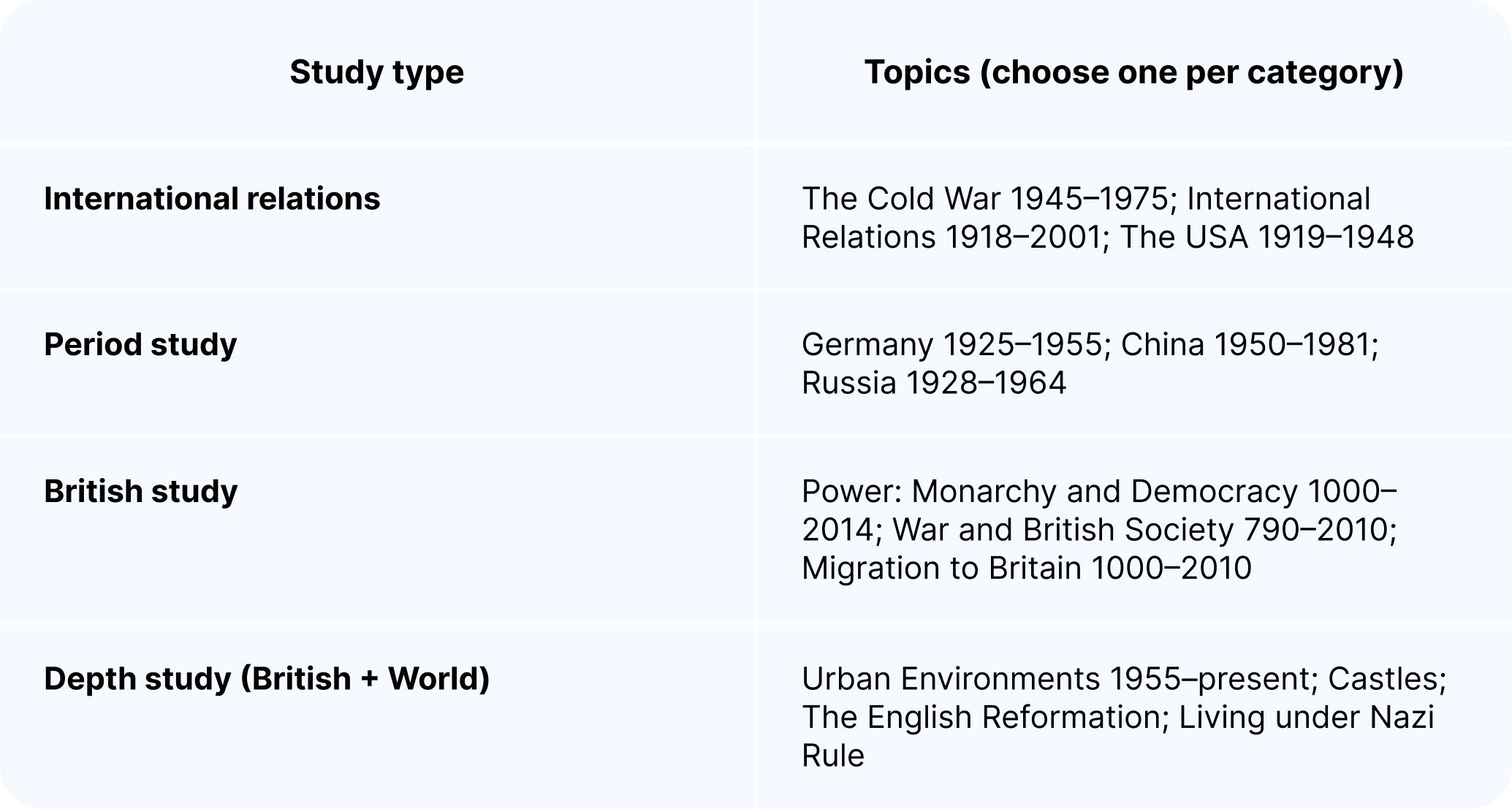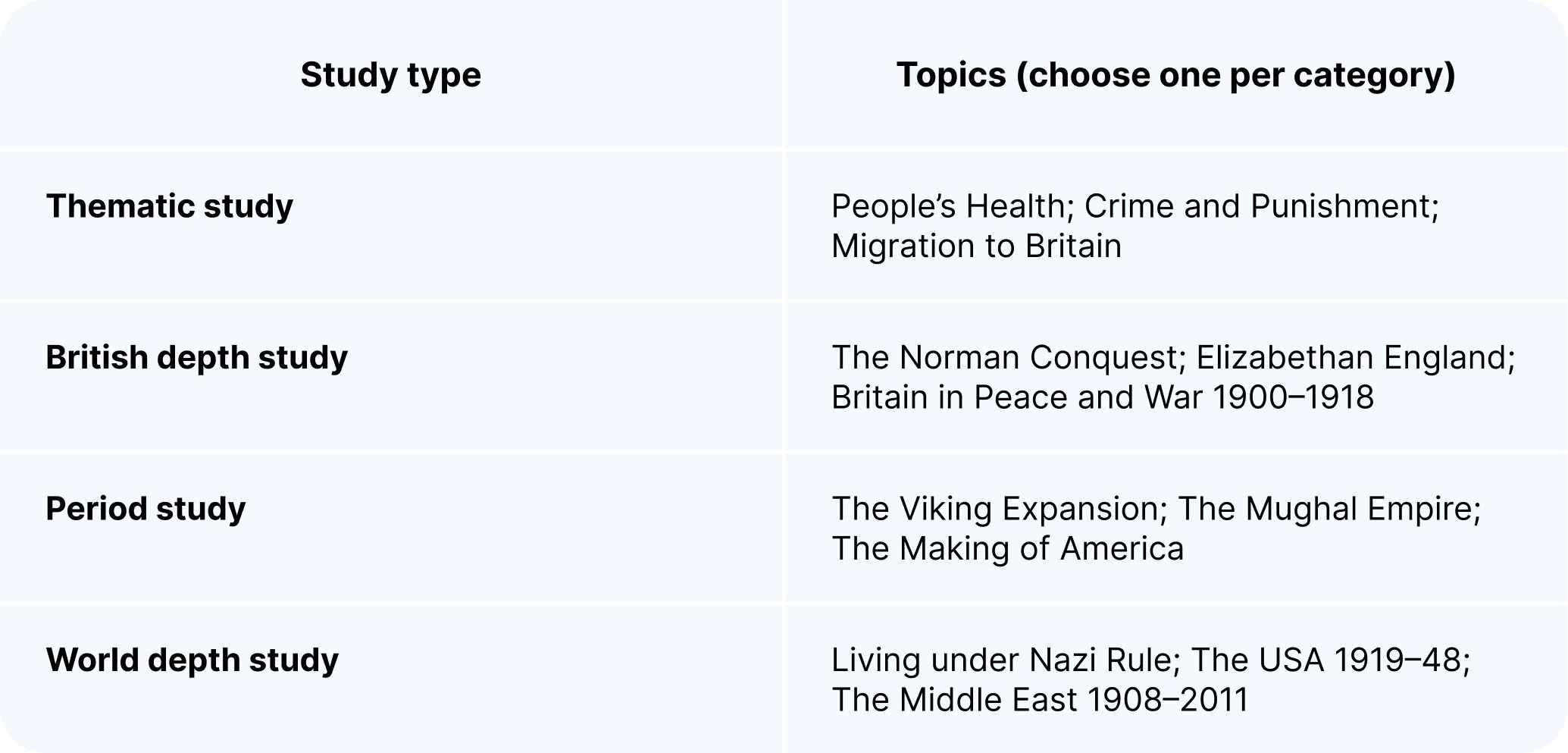GCSE History breakdown: topics, learning objectives & sample questions
By Atom | Sep 10, 2025, 3:07 PM
Contents
Struggling to make sense of all the content in GCSE History? This guide breaks it down into clear topic areas, key learning objectives, and example questions to help students revise with confidence.
What this post covers:
An overview of common GCSE History topics (AQA, Edexcel, OCR)
What students are expected to know and do for each topic
Sample exam-style questions to guide revision
Tips for tackling source-based and essay questions
Why History matters for GSCE success
GCSE History is more than names and dates; it’s about understanding cause and consequence, evaluating evidence, and forming structured arguments. These core academic skills build exam confidence and prepare students for A-level and beyond.
Through exploring causes, consequences, and interpretations, learners build confidence in analysis and argumentation. These skills are especially useful in A-level English, politics, and religious studies. They are also highly valued in future law, journalism, education, and public policy careers.
Key topics in GCSE History
Different exam boards structure their GCSE History specifications slightly differently, but all aim to build historical understanding through breadth and depth. Here’s a breakdown of the topic types students will encounter:
AQA:

Students study 4 units: 1 thematic, 1 British depth, 1 period, and 1 modern depth.
Edxecel (Pearson):

Students study a Thematic Study with Historic Environment, a British Depth Study, a Period Study, and a Modern Depth Study.
OCR A (Explaining the Modern World):

Students study one International Relations, one Period Study, one British Thematic study and one British or World Depth Study.
OCR B (Schools History Project):

OCR B allows for a wider global focus and is structured around depth, period and thematic studies.
What students need to learn
Each topic comes with clear assessment objectives. Students must be able to:
AO1: Demonstrate knowledge and understanding of the key features of the periods studied
AO2: Explain and analyse historical events and periods using second-order concepts (e.g. cause, consequence, change, significance)
AO3: Analyse, evaluate and use sources
AO4: Analyse and evaluate interpretations of the past
Tip: Build revision around these AOs to stay focused and exam-ready.
Sample questions for revision
Here are example questions by topic type to help students practise applying knowledge:
Thematic study
Medicine through time (c1250–present)
Q: How far do you agree that the role of the individual was the main factor in the development of medicine from 1700 to 1900? (16 marks)
Focus: Causation and significance
Tip: Structure the essay using factors like individuals, science, and technology
Period study
The Cold War, 1941–91
Q: Explain two consequences of the Berlin Blockade, 1948–49. (8 marks)
Focus: Cause and consequence
Tip: Link each consequence to its wider impact on superpower relations
British depth study
Elizabethan England
Q: How convincing is Interpretation A about the threat of the Spanish Armada? (8 marks)
Focus: Source evaluation (AO4)
Tip: Use your own knowledge to test the interpretation’s accuracy
Modern depth study
Weimar and Nazi Germany
Q: Describe two problems faced by the Weimar Republic in the years 1919–23. (4 marks)
Focus: Knowledge recall and concise explanation
Tip: Be specific, focus on political, economic or social issues
How to revise GCSE History effectively
GCSE History revision can feel overwhelming at first, there’s a lot of content, and each question type tests different skills. A focused, structured approach can make revision more manageable and effective.
Here are some proven strategies:
1. Organise topics with timelines and mind maps
Create clear timelines to visualise how events link together
Use colour-coded mind maps to group key themes (e.g. causes of war, medical developments, changes in government)
2. Learn exam technique, not just content
Practise structuring answers using the PEEL method (Point, Evidence, Explanation, Link)
Review mark schemes and examiner reports to understand what strong answers include
Know the difference between describe, explain, evaluate, and assess — and practise responding to each
3. Use active recall
Make flashcards with key facts, dates, and definitions
Quiz regularly using self-testing or free online platforms
Focus more time on topics that feel less secure
4. Break revision into manageable chunks
Use short, focused revision sessions (25–30 minutes) with breaks in between
Alternate between revising content and practising past questions
Don’t try to revise everything at once — target specific papers or question types each week
5. Build confidence with past papers
Practise a range of source, interpretation and essay questions
Try timed conditions to build exam stamina
Review mistakes and rewrite weaker answers using examiner feedback
6. Involve others
Parents can help by asking quick-fire questions or reviewing flashcards
Group revision or explaining topics to others can strengthen understanding
Discuss interpretations together, many questions are about perspectives, not just facts
Final thoughts
With the right strategy and tools, GCSE History doesn’t need to be stressful. Focus on consistent revision, practice past questions, and remember, small steps lead to big gains.
Don’t miss Atom’s GCSE giveaway!

Six months. Six epic prizes. Six chances to make the GCSE season unforgettable.
We’re launching Atom for GCSE prep in 2026, and to celebrate, over the next six months, we’re giving away thousands of pounds worth of prizes to help your child level up their GCSE revision.
Here’s a taste of what’s up for grabs:
The latest Apple tech, including an iPad Air, Vision Pro and more
Festival tickets for Boardmasters and Reading 2026
Europe interrail passes and £1,000 spending money
…and that’s just a few of the amazing prizes available.
Our first two winners have already taken home incredible prizes! Find out who they are and what they won in our latest giveaway update and keep an eye out for news of our November winner.
It’s free to join. UK only. Full T&Cs apply.
Contents
